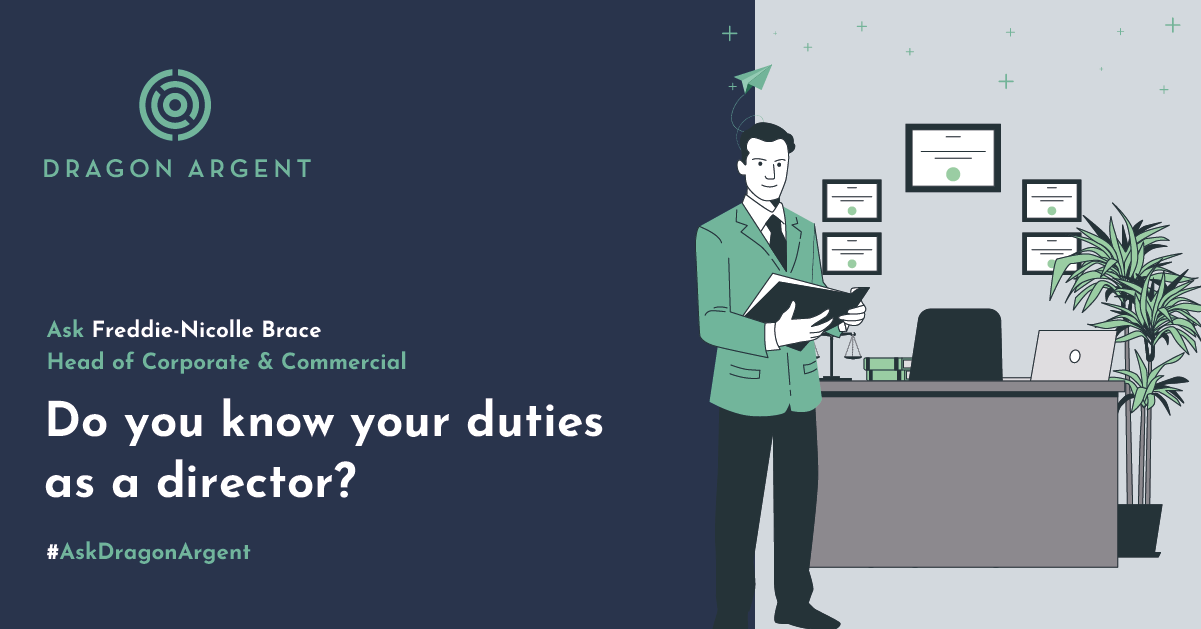Do you know your duties as a director?
The below guide provides directors with a general overview of the key duties and obligations of the role.
Becoming a director is a significant achievement in any career (congratulations!), but with the achievement comes many responsibilities and the need to make significant decisions for the company.
As a director your behaviour will be governed by the Companies Act 2006 which sets out a number of duties that you are expected to comply with. These are in addition to any other contractual duties that might be set out in your service agreement with the company.
Our legal advice for startups as a general legal duties are summarised below and you should make sure that you are familiar with and understand these fully.
Who is a director?
MYTH: You have to be appointed formally to be a director.
This is a common misunderstanding. In fact being formally appointed is only one of the ways in which you can be classified as a director of a company.
De Facto Director
A person who acts as if they are a director and makes company decisions although not validly appointed.
How do I know if I am one?
You may be a de facto director if you act in a senior, decision-making role rather than just being a member of the management team.
Shadow Director
A person who has not been officially appointed but who has control over the company because their instructions are usually followed.
How do I know if I am one?
A shadow director may not be aware that they are one! Think about how often you tell the company what to do and how often the company does what you tell it.
Formally Appointed Director
A person who is formally appointed in accordance with the company’s articles of association.
Executive Director
A member of the board who is actively involved in the day-to-day management and running the operations of the company. For example, a CFO is an executive director.
Alternate Director
Someone who has temporarily been appointed by an existing director, in accordance with the company’s articles of association, to attend board meetings.
Non- Executive Director
A board member without management responsibilities. They are usually selected because they have sought after qualities and experience that they can bring to the board.
What are my duties under the Companies Act 2006?
S171 CA 2006 – Duty to act within constitution/ powers
Act in accordance with the company’s constitution and only exercise powers for the purpose for which they are conferred.
Make decisions in accordance with articles, rule of law and any enactment.
Practical point: make sure you are familiar with the company’s Articles of Association and Shareholders Agreement and note any powers or restrictions which apply to you in your capacity as director.
S172 CA 2006- Duty to promote the success of the company – THIS IS THE KEY OVERIDING DUTY
Act in a way you consider, in good faith, would be most likely to promote the success of the company for the benefit of its members as a whole.
Non exhaustive list of factors that a director ought to consider include:
the likely consequence of any decision in the long term;
the interests of the company’s employees;
the need to foster the company’s business relationships with suppliers, customers and others
the impact of the company’s operations on the community and the environment;
the desirability of the company maintaining a reputation for high standards of business conduct; and
the need to act fairly as between the members of the company
Practical point: You will need to understand & determine what ‘ success’ is. This will be different for each company.
S173 CA 2006 - Duty to exercise independent Judgment
Must not fetter your own discretion or restrict the exercise of your own judgment.
Must not “follow the crowd” or act under the instructions of others.
S174 CA 2006 – Duty to exercise reasonable skill, care, and diligence
Exercise the standard of care, skill and diligence that would be exercised by a reasonably diligent person with:
(1) the general knowledge, skill and experience reasonably expected of a person carrying out same functions; and
(2) the general knowledge, skill and experience that director actually has.
S175 CA 2006- Duty to avoid conflicts of interest
A director must avoid a situation in which he has, or can have, a direct or indirect interest that conflicts, or may conflict, with the interests of the company.
Be aware that you can continue to be bound by the duty even once you have resigned as a director.
S176 CA 2006 – Duty not to accept benefits from third parties…
…unless it cannot reasonably be expected to give rise to a conflict of interest
Be aware that you can continue to be bound by the duty even once you have resigned as a director.
Also be aware that the Bribery Act 2010 may come in to play.
Practical point: Ensure that if the company has a hospitality/gifts policy in place you have checked it carefully before acceptance of any benefits.
S177/ S182 CA 2006- Duty to declare interest in proposed or existing transaction
A director is required to declare the direct and indirect nature and extent of the interest.
Practical point: Ensure that any interests are noted in your board minutes and always check the constitutional documents to see whether shareholder approval is required.
If you or your company would like any further information on appointment of directors, service agreements or directors’ duties (breach or otherwise), book in a discovery call with our corporate and employment teams:







